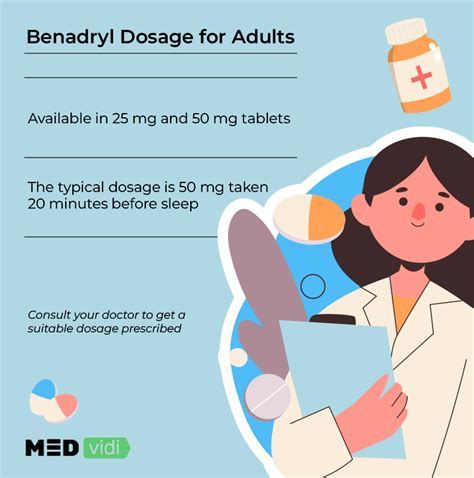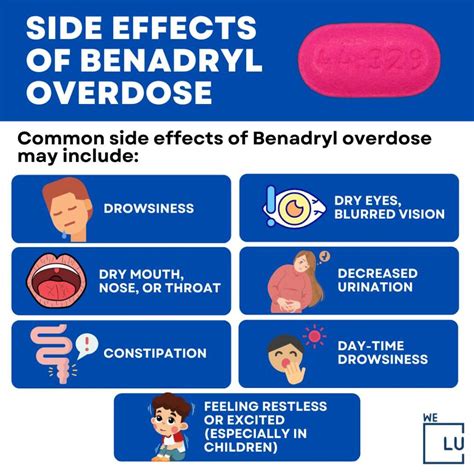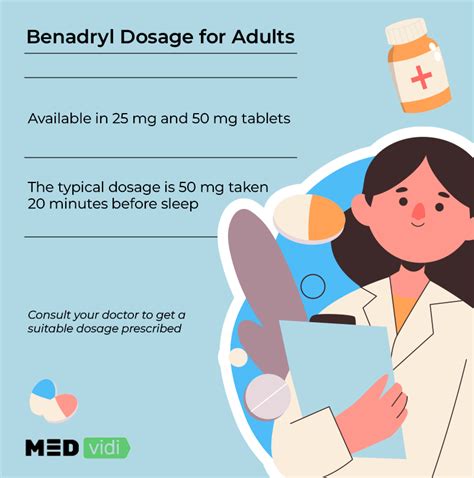Intro
Discover 5 Benadryl sleep tips for a restful night, including dosage, side effects, and interactions, to improve insomnia, anxiety, and relaxation with safe medication usage and sleep hygiene practices.
Taking Benadryl for sleep has become a common practice among individuals struggling with insomnia or other sleep disorders. However, it is essential to understand the potential risks and benefits associated with using this medication for sleep. Benadryl, also known as diphenhydramine, is an antihistamine that can cause drowsiness, making it a popular choice for those seeking a quick fix for their sleep problems. Nevertheless, it is crucial to approach this topic with caution and consider the long-term effects of relying on Benadryl for sleep.
The importance of addressing sleep issues cannot be overstated, as chronic sleep deprivation can lead to a range of health problems, including cardiovascular disease, diabetes, and obesity. Furthermore, sleep plays a critical role in cognitive function, memory consolidation, and emotional regulation. Therefore, finding effective and safe solutions for sleep disorders is vital. While Benadryl may provide temporary relief, it is essential to explore other options and consider the potential consequences of relying on this medication for extended periods.
As we delve into the world of Benadryl and sleep, it is crucial to recognize that this topic is complex and multifaceted. On one hand, Benadryl can provide rapid relief for those struggling with insomnia or other sleep disorders. On the other hand, the potential risks and side effects associated with long-term use cannot be ignored. In this article, we will provide an in-depth examination of Benadryl sleep tips, exploring the benefits, risks, and alternatives to using this medication for sleep.
Understanding Benadryl and Sleep

Benefits of Using Benadryl for Sleep
The benefits of using Benadryl for sleep are primarily related to its ability to induce rapid drowsiness. Some of the advantages of using Benadryl for sleep include: * Rapid onset of action: Benadryl can start working within 30 minutes to an hour, making it a quick fix for those struggling with insomnia. * Ease of use: Benadryl is widely available over-the-counter, and its use is relatively straightforward. * Cost-effective: Compared to prescription sleep aids, Benadryl is generally less expensive.Risks and Side Effects of Using Benadryl for Sleep

Alternatives to Using Benadryl for Sleep
Given the potential risks and side effects associated with using Benadryl for sleep, it is essential to explore alternative solutions. Some alternatives to using Benadryl for sleep include: * Establishing a consistent sleep schedule: Going to bed and waking up at the same time every day can help regulate the body's internal clock. * Creating a sleep-conducive environment: Making the bedroom a sleep sanctuary by ensuring it is dark, quiet, and cool can improve sleep quality. * Avoiding caffeine and electronics before bedtime: Avoiding stimulating activities and substances before bedtime can help promote relaxation and improve sleep. * Practicing relaxation techniques: Techniques such as meditation, deep breathing, and yoga can help reduce stress and promote relaxation, making it easier to fall asleep.Benadryl Sleep Tips

Additional Considerations
When using Benadryl for sleep, it is essential to consider the following: * Age: Older adults may be more susceptible to the side effects of Benadryl, including cognitive impairment and increased risk of falls. * Pregnancy and breastfeeding: Benadryl is generally considered safe during pregnancy and breastfeeding, but it is essential to consult with a healthcare provider before using it. * Underlying medical conditions: Certain medical conditions, such as glaucoma, urinary retention, and gastrointestinal obstruction, may be exacerbated by Benadryl.Conclusion and Final Thoughts

We invite you to share your thoughts and experiences with using Benadryl for sleep in the comments below. Have you found it effective, or have you experienced any side effects? What alternative solutions have you tried, and how have they worked for you? By sharing your stories and insights, we can create a community that supports and informs each other about the complex topic of sleep and Benadryl.
Is Benadryl safe for long-term use?
+Benadryl is not recommended for long-term use, as it can lead to dependence and addiction. Additionally, long-term use can increase the risk of cognitive impairment, particularly in older adults.
Can I use Benadryl with other sleep aids?
+It is generally not recommended to use Benadryl with other sleep aids, as this can increase the risk of adverse reactions and interactions. However, some natural sleep aids, such as melatonin or valerian root, may be safe to use in combination with Benadryl. Always consult with a healthcare provider before combining medications.
What are the potential side effects of using Benadryl for sleep?
+The potential side effects of using Benadryl for sleep include drowsiness, dry mouth, dizziness, and cognitive impairment. Long-term use can lead to dependence and addiction, as well as increased risk of falls and accidents.
